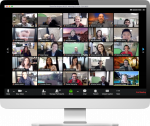I’m trying to plan some alternative teaching options for the Fall, since I might be temporarily incapacitated for a bit — I’m waiting on a call from podiatrist right now, which might define some of my limitations. One of the obvious fall-back strategies would be to do some lectures remotely, since we’re all well-trained on using Zoom nowadays. Except that now I learn Zoom wants to use us.
Zoom has rolled out a controversial update to its terms of service, adding a clause that allows it to use customer data for AI and ML training.
The pertinent clause is quoted below:
You consent to Zoom’s access, use, collection, creation, modification, distribution, processing, sharing, maintenance, and storage of Service Generated Data for any purpose, to the extent and in the manner permitted under applicable Law, including for the purpose of product and service development, marketing, analytics, quality assurance, machine learning or artificial intelligence (including for the purposes of training and tuning of algorithms and models), training, testing, improvement of the Services, Software, or Zoom’s other products, services, and software, or any combination thereof, and as otherwise provided in this Agreement. In furtherance of the foregoing, if, for any reason, there are any rights in such Service Generated Data which do not accrue to Zoom under this Section 10.2 or as otherwise provided in this Agreement, you hereby unconditionally and irrevocably assign and agree to assign to Zoom on your behalf, and you shall cause your End Users to unconditionally and irrevocably assign and agree to assign to Zoom, all right, title, and interest in and to the Service Generated Data, including all Proprietary Rights relating thereto.
Those bastards. This is a sneaky way of violating privacy, confidentiality, and our ownership of classroom content. If they announced that my lectures could be lifted wholesale and sold for use by anyone else, that would be less of a violation than this. They figure they could use a computer proxy to take all that content, massage it, refilter it, and then distribute it without attribution in the guise of AI — no one will be able to blame or credit me as a source, which is an essential part of the way science works.
They’ll also be able to steal my students’ contributions, although mostly they’re all silent black rectangles on the screen. They will chime in with good stuff now and then, though, all of it to be grist for the AI machine.
Also, people use Zoom for business meetings, where real money is at stake. I wonder how they’re going to take to the idea of a digital spy lurking in the background?
Or how about medical consultations? Are those to be AI fodder, too?











